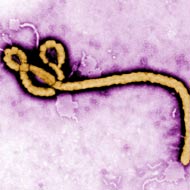
Pauline Cafferkey falls ill for the second time
A nurse who contracted Ebola last year has been readmitted to hospital after falling ill for the second time.
Speaking to the Sunday Mail, nurse Pauline Cafferkey's family criticised the hospital that initially failed to diagnose her second outbreak of the virus.
Ms Cafferkey is said to have visited an out-of-hours GP clinic at the Victoria Hospital in Glasgow last Monday night (5 October). But the GP that assessed her diagnosed a virus and sent her home.
Speaking to the Sunday Mail, Ms Cafferkey's family said they believe the hospital "missed a big opportunity to give the right diagnosis".
Her sister Toni said: "We think there have been major failings and we just want her to pull through."
NHS Greater Glasgow and Clyde (NHSGGC) confirmed that Ms Cafferkey attended the out-of-hours GP service on Monday. A spokesperson is quoted by the BBC as saying: "Her management and the clinical decision taken based on the symptoms she was displaying at the time were entirely appropriate.
"All appropriate infection control procedures were carried out as part of this episode of care."
Ms Cafferky was admitted to the Queen Elizabeth Hospital in Glasgow on Tuesday, 6 October, before being transferred to the Royal Free Hospital in London in the early hours of Friday morning (9 October).
Dr Emilia Crighton, NHSGGC director of public health, said: "Pauline's condition is a complication of previous infection with the Ebola virus.
"The risk to the public is very low. In line with normal procedures in cases such as this, we have identified a small number of close contacts of Pauline's that we will be following up as a precaution."
Image (c) CDC Global/Wikimedia Commons CC BY 2.0



 The latest
The latest